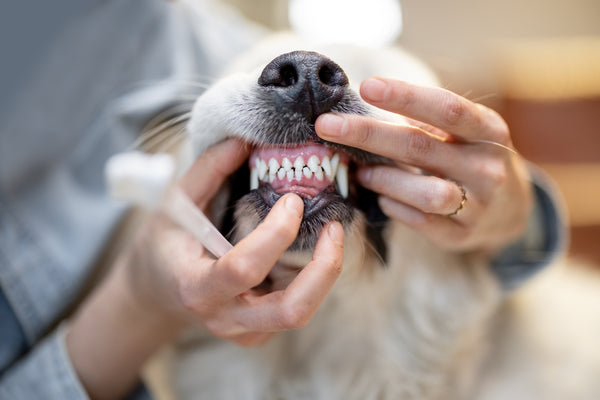Dogs are more than just pets. They are our best friends, our companions, and members of our families. Just like humans, dogs need proper nutrition and a well-balanced diet to live a healthy life.
One way to ensure that your furry friends are getting the essential nutrients they need is by providing them with the right vitamins. In this article, we will discuss 6 essential dog vitamins that can help your dog maintain optimal health and well-being.
1. Vitamin A
Vitamin A is crucial for maintaining healthy skin, coat, and vision in dogs. It also aids in proper immune function and supports growth and development. Dogs can obtain vitamin A through their diet from sources such as liver, fish oil, eggs, and dairy products.
However, it is important to note that too much vitamin A can be toxic for dogs, so it's best to consult with your veterinarian before supplementing their diet.
2. Vitamin B
The B vitamins are a group of nutrients that play a vital role in metabolic processes and energy production. Dogs require these vitamins for healthy cell function, nervous system health, and support for their immune system.
B vitamins can be found in foods such as meat, whole grains, and vegetables. If your dog is not getting enough of these nutrients from their diet, consider adding a B-complex supplement.
3. Vitamin C
Vitamin C is well known for its immune-boosting properties in humans, but it also plays an important role in dogs. This vitamin is essential for collagen production, which is necessary for healthy bones, joints, and skin in dogs.
It also acts as an antioxidant to help protect the body from free radicals. Dogs can produce vitamin C on their own, but supplementation may be necessary for older or sick dogs.

4. Vitamin D
Vitamin D is crucial for maintaining strong bones and teeth in dogs. It also aids in the absorption of calcium and phosphorus, which are needed for healthy bone growth. Dogs can obtain vitamin D from exposure to sunlight, but it can also be found in foods such as fish, eggs, and liver.
However, too much vitamin D can be harmful to dogs, so it's important to monitor their intake. Consult with your veterinarian before adding vitamin D supplements to their diet.
5. Vitamin E
Vitamin E is a powerful antioxidant that helps protect cells from damage and supports immune function in dogs. It also aids in maintaining healthy skin and coat and has been linked to improved cognitive function in aging dogs.
Dogs can obtain vitamin E from foods such as nuts, seeds, and leafy greens, but supplementation may be necessary for dogs with certain health conditions, as well as for older dogs.
6. Vitamin K
Vitamin K is essential for blood clotting and maintaining healthy bones in dogs. It can be found in foods such as liver, leafy greens, and whole grains.
However, it's important to note that some types of rat poison contain vitamin K as an antidote, so it's important to keep these substances out of reach from dogs. Consult with your veterinarian before supplementing your dog's diet with vitamin K.
7. Zinc
Zinc is an essential mineral that plays a crucial role in immune function and helps with wound healing in dogs. It also aids in proper growth and development, as well as maintaining healthy skin and a shiny coat.
Dogs can obtain zinc from foods such as meat, eggs, and seafood, but supplementation may be necessary for dogs with certain health conditions or older dogs.

8. Omega 3 Fatty Acids
Although not technically a vitamin, omega-3 fatty acids are essential for maintaining your dog's overall health. These healthy fats help support heart and brain function, reduce inflammation, and improve skin and coat health in dogs.
Omega 3s can be found in fish oil supplements or through foods such as salmon, sardines, and flaxseed.
9. Probiotics
Again, this one is not a vitamin, but probiotics are nevertheless essential for maintaining your dog's gut health. These healthy bacteria can help improve digestion and boost the immune system in dogs. They can be found in some dog food formulas or can be added to their diet through supplements.
FAQs on Vitamins for Dogs
Can I give my dog human vitamins?
No, vets don’t recommend giving dogs human vitamins because they may contain ingredients that are toxic to dogs. It's best to consult with your veterinarian for proper dog-specific vitamins.
Are there any signs that my dog may be lacking in certain vitamins?
Yes, some common symptoms of vitamin deficiencies in a dog's body include a dull coat, skin issues, digestive problems, and lethargy.
Can vitamin supplements help with my dog's joint problems?
Yes, certain vitamins such as glucosamine and chondroitin can help with symptoms of joint problems in dogs. However, it's important to consult with your veterinarian before adding any supplements to your dog's diet for any joint pain or issues.
Are there any vitamins that pregnant dogs should be given?
Yes, pregnant or nursing dogs need to have adequate levels of folic acid, iron, and calcium in their diet. Consult with your veterinarian for specific recommendations.
Can my dog get enough vitamins from their diet alone?
Dogs can obtain all the necessary vitamins from a well-balanced diet and high-quality pet food. However, some dogs may require supplementation depending on their individual needs.
Do puppies need vitamin supplements?
Puppies generally do not need additional vitamin supplementation as long as they are eating a high-quality, balanced diet. However, consult with your veterinarian for specific recommendations for your puppy's needs.
Can vitamins help improve my dog's allergies?
Some vitamins, such as Vitamin C and Omega 3 fatty acids, may help alleviate allergy symptoms in dogs, but it's still important to consult with your veterinarian for a proper treatment plan.

How often should I give my dog vitamin supplements?
The frequency of giving your dog vitamin supplements will depend on their individual needs and the type of supplement. Always follow the recommended dosage on the packaging or consult with your veterinarian for specific instructions.
Are there any vitamins that can be harmful to dogs?
Yes, certain dog supplements (such as vitamins A and D) can be toxic to dogs in high doses. Always consult with your veterinarian before adding any supplements to your dog's diet.
Can I give my senior dog the same vitamin supplement as my adult dog?
Senior dogs are in a much different life stage and therefore have different nutritional needs than adult dogs, so it's important to consult with your veterinarian for specific vitamin recommendations for your senior dog's health.
It's also important to monitor their intake, as older dogs may have a harder time processing and absorbing certain vitamins.
Can my dog take vitamins if they have a sensitive stomach?
It's best to consult with your veterinarian before giving your dog any vitamin supplements if they have a sensitive stomach. They may recommend specific types of vitamins that are easier on their digestive system.
Are there any natural sources of vitamins for dogs?
Yes, many fruits and vegetables, such as carrots, blueberries, and sweet potatoes, contain vitamins that can benefit dogs. However, always consult with your veterinarian before adding any new foods to your dog's diet.
How do I know if my dog is getting enough vitamin B12?
Signs of a vitamin B12 deficiency in dogs include anemia, weakness, and lack of appetite. Consult with your veterinarian for proper testing and treatment if you suspect your dog may have a deficiency.
Can vitamins help with my dog's dental health?
Yes, certain vitamins and minerals such as Vitamin D and calcium can aid in maintaining strong teeth and bones in dogs. However, it's important to also provide proper dental care for your dog, such as regular brushing and professional cleanings.
Are there any specific vitamins that can help boost my dog's immune system?
Vitamins A, C, and E are known for their immune-boosting properties in dogs. However, it's important to consult with your veterinarian before adding any supplements to your dog's diet for this purpose.

Can vitamin deficiencies cause behavior problems in dogs?
Yes, a lack of certain vitamins and supplements can affect a dog's mood and behavior. It's important to consult with your veterinarian if you notice any changes in your dog's behavior.
Can my dog take a vitamin supplement while on medication?
Veterinarians should be talked with before giving your dog any supplements while they are on medication, as it could potentially interact with their medication or cause adverse effects.
Are there any vitamins that can help improve my dog's cognitive function?
Vitamins such as B vitamins and Omega 3 fatty acids may help improve brain health and cognitive function in dogs. However, it's important to consult with your veterinarian for proper dosages and recommendations.
Can certain vitamins help prevent common health issues in dogs?
Yes, providing your dog with the necessary vitamins can help prevent certain health issues such as skin problems, joint issues, and digestive problems. However, it's important to consult with your veterinarian for the best course of action for your dog's individual needs.
All in All ...
Vitamins play a crucial role in maintaining your dog's overall health and well-being. By ensuring that your dog has adequate levels of essential vitamins, you can help prevent common dog health issues and improve their quality of life.
However, it's important to always consult with your veterinarian for proper recommendations and dosage guidelines for pet supplements. Remember that every dog is unique and may have different needs when it comes to vitamin supplementation. With proper care and nutrition, you can help your dog live a healthy and happy life!













